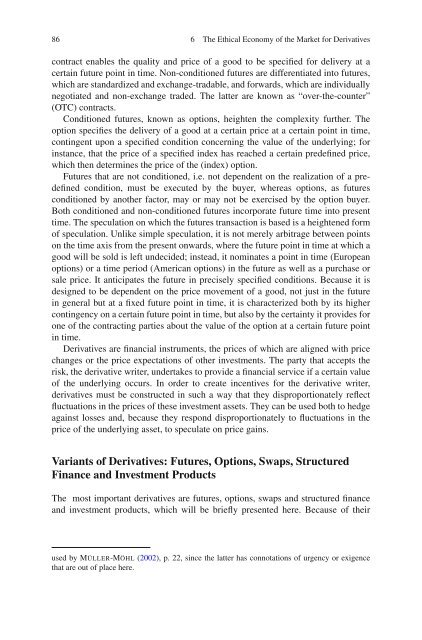The Ethics of Banking: Conclusions from the Financial Crisis (Issues ...
The Ethics of Banking: Conclusions from the Financial Crisis (Issues ...
The Ethics of Banking: Conclusions from the Financial Crisis (Issues ...
You also want an ePaper? Increase the reach of your titles
YUMPU automatically turns print PDFs into web optimized ePapers that Google loves.
86 6 <strong>The</strong> Ethical Economy <strong>of</strong> <strong>the</strong> Market for Derivatives<br />
contract enables <strong>the</strong> quality and price <strong>of</strong> a good to be specified for delivery at a<br />
certain future point in time. Non-conditioned futures are differentiated into futures,<br />
which are standardized and exchange-tradable, and forwards, which are individually<br />
negotiated and non-exchange traded. <strong>The</strong> latter are known as “over-<strong>the</strong>-counter”<br />
(OTC) contracts.<br />
Conditioned futures, known as options, heighten <strong>the</strong> complexity fur<strong>the</strong>r. <strong>The</strong><br />
option specifies <strong>the</strong> delivery <strong>of</strong> a good at a certain price at a certain point in time,<br />
contingent upon a specified condition concerning <strong>the</strong> value <strong>of</strong> <strong>the</strong> underlying; for<br />
instance, that <strong>the</strong> price <strong>of</strong> a specified index has reached a certain predefined price,<br />
which <strong>the</strong>n determines <strong>the</strong> price <strong>of</strong> <strong>the</strong> (index) option.<br />
Futures that are not conditioned, i.e. not dependent on <strong>the</strong> realization <strong>of</strong> a predefined<br />
condition, must be executed by <strong>the</strong> buyer, whereas options, as futures<br />
conditioned by ano<strong>the</strong>r factor, may or may not be exercised by <strong>the</strong> option buyer.<br />
Both conditioned and non-conditioned futures incorporate future time into present<br />
time. <strong>The</strong> speculation on which <strong>the</strong> futures transaction is based is a heightened form<br />
<strong>of</strong> speculation. Unlike simple speculation, it is not merely arbitrage between points<br />
on <strong>the</strong> time axis <strong>from</strong> <strong>the</strong> present onwards, where <strong>the</strong> future point in time at which a<br />
good will be sold is left undecided; instead, it nominates a point in time (European<br />
options) or a time period (American options) in <strong>the</strong> future as well as a purchase or<br />
sale price. It anticipates <strong>the</strong> future in precisely specified conditions. Because it is<br />
designed to be dependent on <strong>the</strong> price movement <strong>of</strong> a good, not just in <strong>the</strong> future<br />
in general but at a fixed future point in time, it is characterized both by its higher<br />
contingency on a certain future point in time, but also by <strong>the</strong> certainty it provides for<br />
one <strong>of</strong> <strong>the</strong> contracting parties about <strong>the</strong> value <strong>of</strong> <strong>the</strong> option at a certain future point<br />
in time.<br />
Derivatives are financial instruments, <strong>the</strong> prices <strong>of</strong> which are aligned with price<br />
changes or <strong>the</strong> price expectations <strong>of</strong> o<strong>the</strong>r investments. <strong>The</strong> party that accepts <strong>the</strong><br />
risk, <strong>the</strong> derivative writer, undertakes to provide a financial service if a certain value<br />
<strong>of</strong> <strong>the</strong> underlying occurs. In order to create incentives for <strong>the</strong> derivative writer,<br />
derivatives must be constructed in such a way that <strong>the</strong>y disproportionately reflect<br />
fluctuations in <strong>the</strong> prices <strong>of</strong> <strong>the</strong>se investment assets. <strong>The</strong>y can be used both to hedge<br />
against losses and, because <strong>the</strong>y respond disproportionately to fluctuations in <strong>the</strong><br />
price <strong>of</strong> <strong>the</strong> underlying asset, to speculate on price gains.<br />
Variants <strong>of</strong> Derivatives: Futures, Options, Swaps, Structured<br />
Finance and Investment Products<br />
<strong>The</strong> most important derivatives are futures, options, swaps and structured finance<br />
and investment products, which will be briefly presented here. Because <strong>of</strong> <strong>the</strong>ir<br />
used by MÜLLER-MÖHL (2002), p. 22, since <strong>the</strong> latter has connotations <strong>of</strong> urgency or exigence<br />
that are out <strong>of</strong> place here.

















